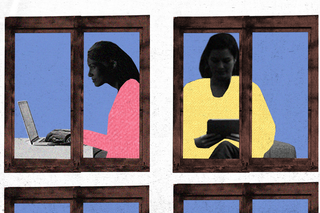
What We Lose When We Don’t Interact With Strangers
The proximity to other human beings, or the second-hand exposure to a smile or a nod, can be intoxicating.

We don’t know Cecilia Pesao, but we know her love story. Pesao met a stranger on a train while traveling from Paris to Barcelona. The two flirted a bit, didn’t exchange numbers, found each other on Twitter, then lost touch. A version of this story was adapted on Modern Love this year (with frills, of course).
The love story started with two strangers and ended with the pair estranged as their real-life Twitter conversations escalated. But the Before Sunrise-like encounter carries a bigger truth. The emotional rewards of a casual conversation between strangers fall on a scale — ranging from indifference to a sense of fulfillment.
But these exchanges find little space, time, and opportunity in our Covid19 cocoons. The question is: do people miss out on life lessons, epiphanies, or small doses of happiness if they don’t talk to someone they never knew?
The answer lies in a paradox. In 2019, researchers Nicholas Epley and Juliana Schroeder looked into what they termed the “anti-social paradox.” They found people consistently underestimated how much they enjoyed speaking to strangers; it may be due to a distrust in others, busy schedules, social anxiety, or just a disregard for a social ritual they unconsciously perform every day. Remember the colleague who took a coffee break simultaneously or the person who rushes for the same metro at dot 8:30? “These wide circles of acquaintances and strangers were the backdrops of our daily lives, familiar, comforting; something we took for granted,” a researcher at the American Psychological Association noted.
To answer what we lose, we must also look at what we gain from meeting new people and chatting with strangers. At one level, casual encounters are linked to better mental health, emotional well-being, and a sense of connection to the community. People spend a good part of every day in random people’s companies, be it their daily commute on foot or metro, sitting in a cafe or park, buying groceries, or just going for a walk. Stolen glances or casual conversations about work or weather form part of our daily experiences. “These brief connections with strangers are not likely to turn a life of misery into one of bliss. However, they can change unpleasant moments – like the grind of a daily commute – into something more pleasant,” Epley and Schroeder wrote. Their research found that a casual conversation on the way to work may leave both strangers happier. Moreover, an absence of this faint connection led to people feeling lonelier.
A casual conversation enthusiast told The Atlantic that this form of connection changed her life. When times got hard, she turned to random exchanges with strangers “to stave off the loneliness.” A 2017 study also found interactions with strangers are linked to higher self-esteem in American young adults.
“If you think that talking to a stranger is likely to be unpleasant, you’ll never try and so never discover that your expectations might be wrong. This can keep us mistakenly isolated and disconnected from others,” Epley and Schroeder added.
Related on The Swaddle:
India Ranks Low on Index Measuring Small Acts of Kindness to Strangers
A raft of studies also shows casual exchanges with strangers tend to make people more trustful and optimistic. Mostly because talking with unfamiliar people and hearing their voices shows the depth of thoughts, feelings, emotions, vulnerabilities — very much like us. These random snatches do form a bond and also widen one’s worldview. “…the proximity I feel to other human beings, and the second-hand exposure to a smile or a nod is intoxicating. It’s a bigger rush than from those sizeable iced coffees,” columnist Amelia Lester wrote, arguing that casual interactions with people we’ve never met can uplift our spirits. Moreover, talking to strangers gives people a relatively similar boost as being helpful does; that is, the emotional rewards of helping someone and talking to a stranger often overlap.
The lack of these exchanges, then, makes for a morbid world. With our social lives severely restricted, the opportunity to find meaning and optimism in public settings is reduced — further impacting one’s mental health.
Psychologist Gillian Sandstrom and a group of experts looked into the phenomenon of a “liking gap.” This gap talks about how most people believed they liked the stranger more than the stranger, further discouraging people from making eye contact. The liking gap is only more pronounced as people deal with insecurities and Covid19 concerns now. This misperception, however, proves a deterrent in seeking meaningful casual conversations, depriving people of “not only short-term boosts of happiness and belonging but also more lasting benefits, such as meeting new friends, romantic partners, or business contacts,” The Atlantic explained.
This disconnect with strangers takes a toll in an individual and collective sense. Over a decade ago, novelist David Eagleman sketched a similar scenario in his short story Circle of Friends: a world where people’s lives would only include those they remember. “It is only after several weeks of this that you begin to feel forlorn. You wonder what’s different as you saunter through the vast quiet parks with a friend or two. No strangers grace the empty park benches. No family unknown to you throws breadcrumbs for the ducks and makes you smile because of their laughter,” he wrote.
One would think there’s little at stake because conversations with strangers anyway circled small talk. But this idea is flawed, for small talk comes with its own benefits. The pandemic is the biggest teller: in the absence of empty chatter or basal questions, people were “forced to focus on their work or more intense conversations with family and close friends, many were tired,” The Economist argued with many people feeling bored, marginalized, lonely. “If you’re lucky, by 2021, more people will be chatting empty again, including trains, buses, offices, shops, and restaurants. Studies suggest that they will benefit.”
Related on The Swaddle:
How Friendship Evolved Under Lockdown Amidst Cathartic Group Chats, Food Parcels
During the pandemic, “we have learned to see strangers as potential carriers of a dangerous virus, as threats, so we do our best to avoid them,” Yale psychologist Laurie Santos told BBC Future.
Smiling or chatting with strangers is like a habit. And as we begin to unlearn this in a physically distanced world, our expectations of social interaction also change. The most significant loss, perhaps, is one where intimacy and connection will become elusive in our daily setting. “If we underestimate the positive effects (that instances of reaching out) can have on others, we might not do them,” Epley said.
In one way, “it’s fundamentally dehumanizing to be surrounded by people and then never interact and engage with them,” as Schroeder told The Atlantic. The social dynamic is disrupted. It takes away from people’s identity as social beings who find pleasure in connection (big or small). Still, it reduces the stranger to mere obstacles in someone’s navigation of a city. The result is a “superficial glimpse of their full humanity.”
This doesn’t mean we accost people on the streets or cafes with unremitting questions. No, the allure of an interaction with a stranger lies in its spontaneity, the spur of the moment. “The Takeaway: Assume that reaching out to another person, even someone you don’t know well, will have a positive effect on both of you—especially when you’re physically apart,” a blog noted.
Think of emotional and mental well-being as a tall tower of Jenga, with these casual conversations forming some blocks. Removing any block without care can tip the whole tower. We then must find new ways to connect at a time when any bond, physical or emotional, feels thin.
What would have Pesao lost if she had never met her stranger on a train? A brief friendship, a moment of levity at a sordid time — and a good story.
Saumya Kalia is an Associate Editor at The Swaddle. Her journalism and writing explore issues of social justice, digital sub-cultures, media ecosystem, literature, and memory as they cut across socio-cultural periods. You can reach her at @Saumya_Kalia.
Related


Sally Rooney Boycotts An Israeli Publisher for Translation. What Does It Mean When Artists Take a Stand?
